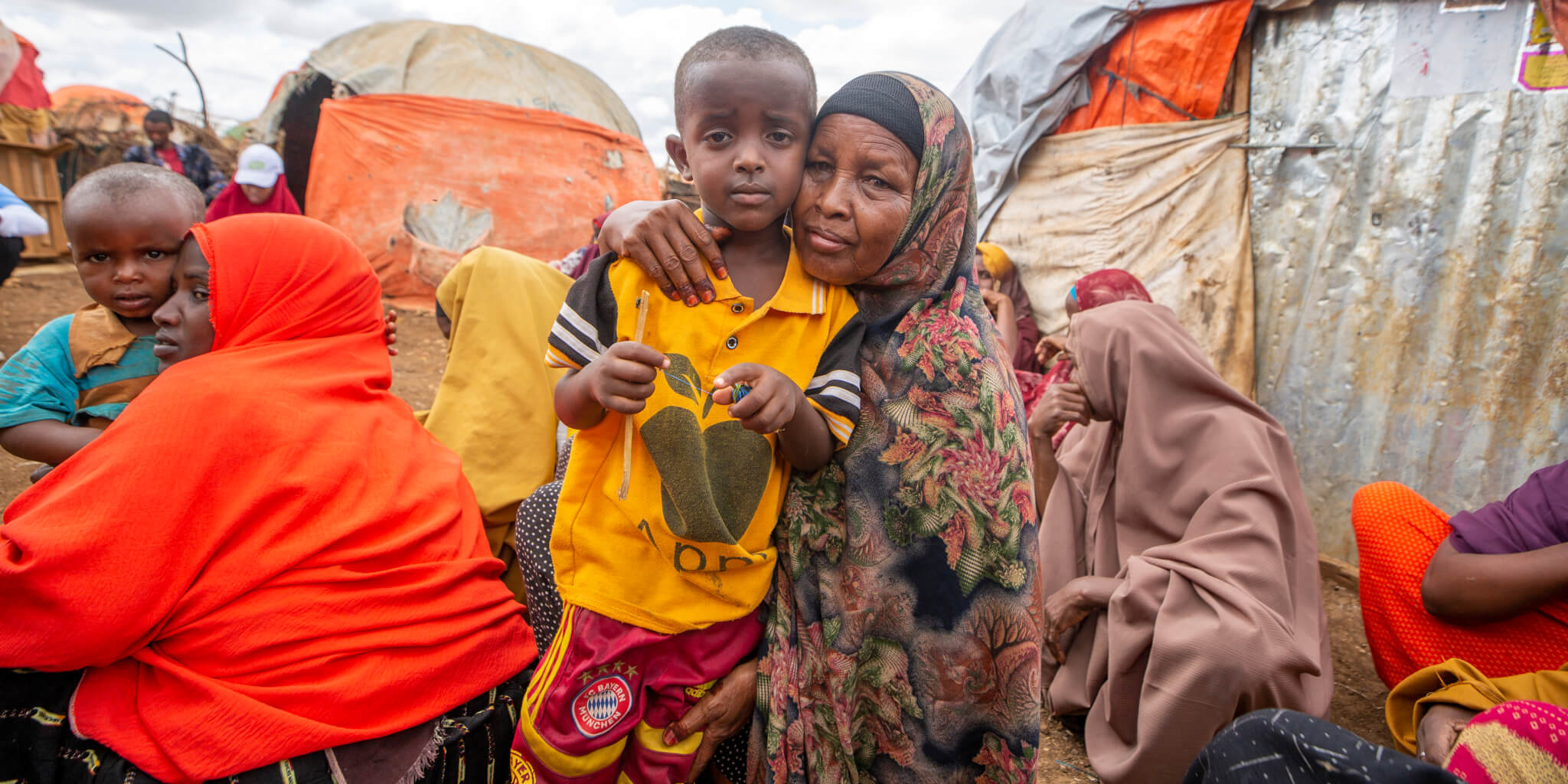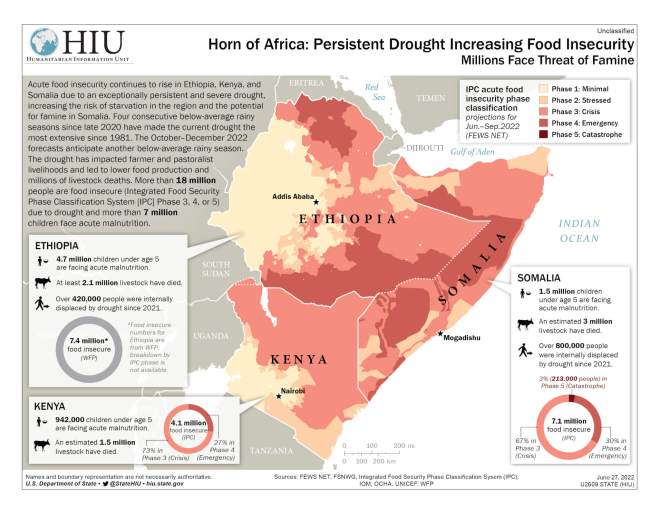
A grandmother with her grandchild. Their family fled their village for the Tawakai Misre IDP camp in Somalia because of prolonged drought. PHOTO: MOHAMED ABDIHAKIM ISMAIL, ACT
More than 18 million people face severe hunger in Somalia, Ethiopia and Kenya as they struggle to survive the worst drought in 40 years. UMCOR is responding to this unfolding crisis.
By Christie R. House
September 14, 2022 | ATLANTA
The United Methodist Committee on Relief (UMCOR) is actively supporting efforts in East Africa to alleviate hunger brought on by a severe drought in the region. Emergency grants to partners in East African countries are providing for the most basic needs for people who left everything behind as their food, agriculture and livestock failed.
Hussein, an elderly father of eight, and his family recently arrived at a camp for displaced people in Beled-Hawa, Somalia. “The people left behind, they have no chance,” he said. “It is just a matter of time until they die. Even here we might die because we have nothing.” The number of people facing crisis hunger levels in Somalia is expected to rise from 5 million to more than 7 million in the coming months.

An arid region on the brink
East Africa, known as the Horn of Africa because of its geographic shape, includes Ethiopia, Somalia, Somaliland, Eritrea and Djibouti, but neighboring Kenya, Sudan and South Sudan share many of the same characteristics. This region is experiencing the worst drought of the last 40 years.
Information gathered by the U.S. State Department’s Humanitarian Information Unit (HIU) estimates that nearly 18 million people in Somalia, Kenya and Ethiopia face severe hunger because the region has had lower-than-average rainfall for four consecutive years. In addition to this climate change, armed conflicts, rising international food and fuel prices, and the COVID-19 pandemic magnify the current crisis. Russia’s war on Ukraine has had direct consequences for the Horn of Africa because the region depends on Ukraine for wheat and fertilizer supplies.
The drought has killed millions of livestock and caused significant drops in food production because of failed harvests. The United Nations notes the cost of an average food basket has risen by 66% in Ethiopia and by 36% in Somalia. Many people are unable to afford even basic items.
In Ethiopia, 4.7 million under the age of five are facing acute malnutrition, 1.5 million in Somalia, and 942,000 in Kenya. In South Sudan, 2 million women and children under 5 are acutely malnourished.
UMCOR’s work in the region
Somalia is identified as the country most at risk in the current crisis. The drought affects almost all regions, but the worst affected area is Beled-Hawa District in Gedo. With an estimated population of 60,000 people, Beled-Hawo is one of the most populated districts in Gedo.
“Starvation is now haunting the entire country of Somalia,” the United Nations High Commissioner on Refugees (UNHCR) reported. “We are seeing more and more families forced to leave everything behind because there is literally no water or food left in their villages. Aid funding urgently needs to be ramped up before it is too late.”
UMCOR partners with Kaalmo Relief Development (KRD) to alleviate the suffering of 500 displaced families in the Beled-Hawa District Camp by supplying food vouchers to meet their short-term nutritional needs. KRD recently conducted a needs assessment, interviewing leaders, families and IDPs in the region, which it shared with UMCOR. The assessment helps UMCOR to make decisions about further support.
Aid agencies in Gedo region are coordinating efforts to support the disaster-affected population with a timely and well-coordinated response. Both local and international agencies work in the region together to avoid duplication of work and respond to identified needs and gaps.
Widespread, consistent drought that causes catastrophic crop and livestock failure often results in massive displacement of whole communities. Because so many people have moved out of their familiar homelands, UMCOR is supporting Mines Advisory Group, a long-time partner, to reach this transient population with vital information. Following numerous conflicts with Ethiopia and years of civil war, large areas of Somalia are heavily contaminated by landmines and other unexploded bombs. This is particularly true in Jubaland state, along the Somalia-Kenya border and the Somaliland-Ethiopian border.
Mines Advisory Group designed an Explosive Ordinance Risk Education program to reach more than 100,000 displaced people, offering life-saving information about mines and unexploded ordinance. It does this using a variety of media, including in-person training with community members and leaders, social media and radio broadcasts. Children are the most likely to encounter mines as they explore unfamiliar territory. This program aims to keep people safe until a time of better security when mines and unexploded bombs can be removed altogether.
A grant released to the United Methodist Church of Ethiopia supports food, water, sanitation, hygiene and other essential items in the Gambela region, which experienced civil unrest and loss of life in June. A second grant to ACT Alliance supports a joint collaboration with Caritas Internationalis, Norwegian Church Aid (NCA) and the Catholic Agency for Overseas Development to reach Ethiopian refugees and their host communities in East Sudan with Water, Sanitation and Hygiene (WASH) projects, protection and gender-based violence support services.
UMCOR is partnering with the Methodist Church in Kenya (MCK) for emergency response in three counties of Northern Kenya. They are providing 8,000 drought-affected internally displaced people (IDPs) with emergency food rations. MCK is also distributing personal protection equipment in these areas where COVID-19 rates are rising.
In South Sudan, UMCOR approved a grant for the Mission to Alleviate Suffering in South Sudan (MASS). MASS was originally established by UMCOR as a country office in 2005. The office is now a South Sudanese nongovernmental organization. The grant provides a cash program for 190 households in the Northern Bahr el Ghazal state, so they can buy food or other necessities according to their specific needs.
Extending relief work in the region
Currently, UMCOR is working on proposals for WASH projects in Kenya and Ethiopia. Both the need for water, but also the need for much better sanitation facilities, are growing concerns. The KDR assessment reported that as many as 500 people share one latrine in an IDP camp in Somalia. This greatly increases the chances of spreading waterborne diseases like cholera.
UMCOR has received a proposal for a project in Kenya that will focus on ways to tap new water sources to supply water to whole communities. An anticipated installation of one new bore hole and the rehabilitation of up to three more, combined with a program of large-scale community education activities, will improve water access, reaching potentially 104,000 residents.
In Ethiopia, another grant will provide more emergency food relief and water.
Although planning projects for long-term water solutions in the Horn of Africa is difficult when emergency relief is still needed, long-term solutions are paramount for the region’s recovery. A dryer climate may be the only possible forecast, as a fifth year of drought looms on the horizon, so better ways of finding, storing and conserving water resources and planting more resilient crops are long-term goals for UMCOR and its partners.
A gift to UMCOR International Disaster Response and Recovery, Advance #982450, will help UMCOR respond to emergency situations when and where they occur.
Christie R. House is a consultant writer and editor with Global Ministries and UMCOR. UMCOR is a subsidiary of the General Board of Global Ministries, The United Methodist Church.

